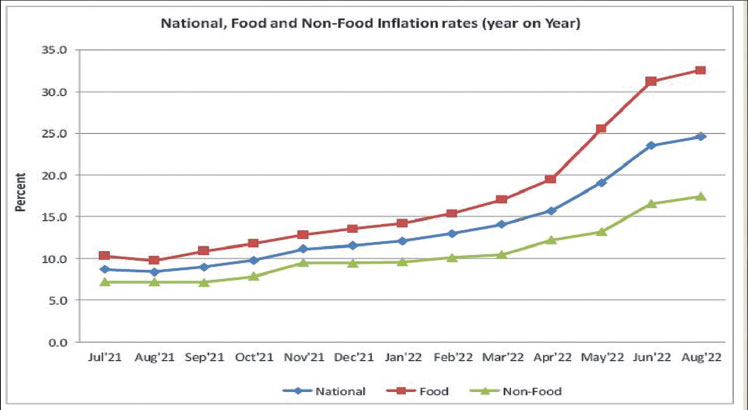The Reserve Bank of Malawi (RBM) says the country’s financial system was vulnerable to macroeconomic risks, including exchange rate depreciation, increase in inflation and interest rates in the first half of this year.
In its June 2022 Financial Stability Report, the RBM said the increase in inflationary and exchange rate pressures have in turn exerted pressure on creditors’ ability to service their domestic and foreign credit obligations, thereby elevating risks to the financial sector.
The analysis, which assessed developments in the banking sector, the non-bank financial institutions, the capital market and the country’s payment system, shows that though the banking sector complied with all key prudential benchmarks, the sector faced credit risks as non-performing loans, were elevated in the period.
According to the RBM, the inflationary and interest rate pressures, coupled with the kwacha depreciation, have reduced the amount of disposable incomes for most households and deteriorated the levels of working capital in corporates, thereby increasing demand for credit.
Reads the report in part: “Threats to financial stability persisted in the sector amidst the prevailing Covid -19 pandemic and inflationary pressures from global supply chain disruptions, combined with elevated energy and food prices due to the Russia and Ukraine war.
“Resultantly, increase in inflationary and exchange rate pressures have continued to exert pressure on creditors’ ability to service their domestic and foreign credit obligations.”
The RBM said though the banks’ capital and liquidity were adequate, the asset quality, as measured by the non-performing loans ratio deteriorated to 6.1 percent from 4.5 percent in December 2021, breaching the acceptable limit of five percent.
In terms of the stock market, the RBM data shows that though the capital market was bullish during the six-month period to June 2022 as seen by the increase in the Malawi all Share Index, the majority of counters experienced share price losses.
RBM said going forward, trading activity is expected to moderate as a result of slowdown in economic activity and subsequent reduction in investors’ disposable income due to the increasing cost of living.
Said the bank: “The effects of the devaluation and rising inflation are likely to cause a shift in choice of investments by investors with many preferring money market investments over long-term investments.”
Commenting on the performance, economic statistician Alick Nyasulu observed that the performance which reflects that of the as country calls for the need for the country to address key governance failure which will exacerbate the risks further and destabilise the financial sector.
“A further deprecation of the kwacha, high inflation and interest rates if not tamed may collapse formal credit markets and the financial system in general. This therefore needs a quick fix because it is an economic disaster waiting to explode,” he said.
For sectors such as insurance, pension and micro finance, the Insurance sector the data shows that though the sectors were r resilient, the sectors were vulnerable to weak liquidity and high credit risks.
Meanwhile, RBM Governor Wilson Banda, who is also the registrar of financial institutions, indicated that in line with the RBM’s mandate of financial stability, it will continue to monitor potential systemic vulnerabilities closely and tackle any threats to stability, which might emerge in the future.
The post Kwacha depreciation, inflation threaten financial stability appeared first on The Nation Online.
 Moni Malawi
Moni Malawi 

